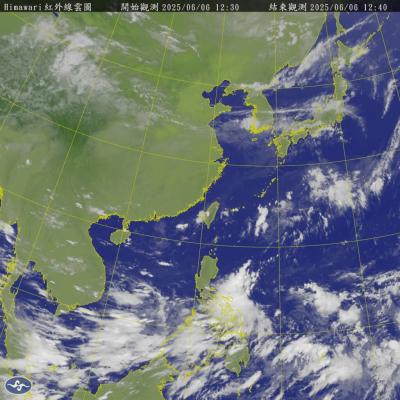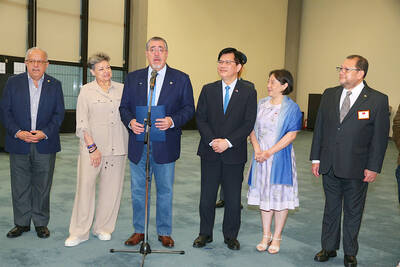Mosquitos might just be a near-ubiquitous nuisance to most, but to Lian Zi-Chin (連日清 ), they are his passion, sworn-enemy and life's work.
The 81 year old Lian, who has worked on mosquito-carried disease prevention for over 60 years, was honored yesterday at the 36th anniversary of the Department of Health (DOH) along with 11 other luminaries in the medical field. He received the medal of health for his recent anti-malaria work in the tiny formal portuguese colony of Sao Tome e Principe.
Lian's commitment to his work is legendary.
"A colleague gave us some blood to provide food for the mosquitos we were breeding for our research," Lian said. "But some refused to drink, while others drank the extracted blood and died."
"In the end, I decided to let them feed off my leg," he said.
When he is not fighting mosquitos, Lian is busy cataloguing the diverse species and observing their behavior.
"There are more than 3,000 different types of mosquitoes in the world," Lian said. "Out of those, only 80 bite."
Of the 80, he added, only 15 are endemic to Taiwan.
"Many varieties are fascinating creatures," Lian said.
He gave mosquitoes of the genus Malaya or "taro mosquitoes," as one such example.
"I call them taro mosquitos because their larvae can often be found in the water-filled cavities formed by leaf axils of the taro plant," he said. "Like many mosquitoes, they feed on nectar, but they way they do it is unique -- they target passing ants and literally rob the nectar that's already in their gullets."
"Other mosquitos help us control their disease-spreading relatives," Lian said.
The giant mosquito, or Toxorhynchite, for example, does not bite humans.
"It is therefore the mosquito we use to produce the dengue fever virus," Lian said. "That way, we do not risk accidentally infecting our staff and others."
"Toxorhynchite larvae are also cannibalistic," Lian said. "They need to disperse their eggs as they are laid so that their offspring will not eat each other. They have been used with some success as biological control agents for other mosquito larvae."
The nation's foremost expert on mosquitoes confirmed what many have suspected for a long time -- that mosquitoes really do prefer biting some people more than others.
"There are three conditions necessary to attract mosquitoes," he said. "Carbon dioxide, body heat and lactic acid in the skin."
"If you have a high body temperature and sweat heavily -- which causes you to have lactic acid on your skin -- you might get more mosquito bites," Lian said.

Greenpeace yesterday said that it is to appeal a decision last month by the Taipei High Administrative Court to dismiss its 2021 lawsuit against the Ministry of Economic Affairs over “loose” regulations governing major corporate electricity consumers. The climate-related lawsuit — the first of its kind in Taiwan — sought to require the government to enforce higher green energy thresholds on major corporations to reduce emissions in light of climate change and an uptick in extreme weather. The suit, filed by Greenpeace East Asia, the Environmental Jurists Association and four individual plaintiffs, was dismissed on May 8 following four years of litigation. The

STAY AWAY: An official said people should avoid disturbing snakes, as most do not actively attack humans, but would react defensively if threatened Taitung County authorities yesterday urged the public to stay vigilant and avoid disturbing snakes in the wild, following five reported snakebite cases in the county so far this year. Taitung County Fire Department secretary Lin Chien-cheng (林建誠) said two of the cases were in Donghe Township (東河) and involved the Taiwan habus, one person was bit by a Chinese pit viper near the South Link Railway and the remaining two were caused by unidentified snakes. He advised residents near fields to be cautious of snakes hiding in shady indoor areas, especially when entering or leaving their homes at night. In case of a

A tropical disturbance off the southeastern coast of the Philippines might become the first typhoon of the western Pacific typhoon season, the Central Weather Administration (CWA) said. The system lacks a visible center and how it would develop is only likely to become clear on Sunday or Monday, the CWA said, adding that it was not yet possible to forecast the potential typhoon's effect on Taiwan. The American Meteorological Society defines a tropical disturbance as a system made up of showers and thunderstorms that lasts for at least 24 hours and does not have closed wind circulation.

DIPLOMACY: It is Guatemalan President Bernardo Arevalo’s first visit to Taiwan since he took office last year, while Eswatini’s foreign minister is also paying a visit A delegation led by Guatemalan President Bernardo Arevalo arrived in Taiwan yesterday afternoon and is to visit President William Lai (賴清德) today. The delegation arrived at Taiwan Taoyuan International Airport at 4:55pm, and was greeted by Minister of Foreign Affairs Lin Chia-lung (林佳龍). It is Arevalo’s first trip to Taiwan since he took office last year, and following the visit, he is to travel to Japan to celebrate the 90th anniversary of diplomatic relations between the two countries. Arevalo said at the airport that he is very glad to make the visit to Taiwan, adding that he brings an important message of responsibility